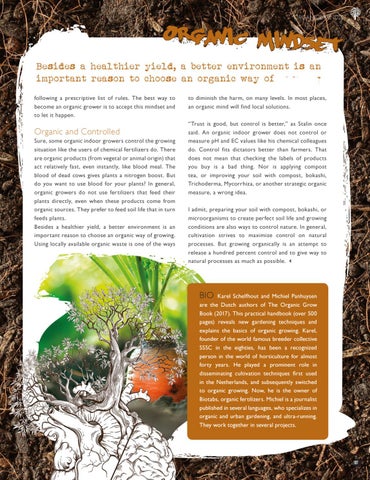following a prescriptive list of rules. The best way to become an organic grower is to accept this mindset and to let it happen.
Organic and Controlled Sure, some organic indoor growers control the growing situation like the users of chemical fertilizers do. There are organic products (from vegetal or animal origin) that act relatively fast, even instantly, like blood meal. The blood of dead cows gives plants a nitrogen boost. But do you want to use blood for your plants? In general, organic growers do not use fertilizers that feed their plants directly, even when these products come from organic sources. They prefer to feed soil life that in turn feeds plants. Besides a healthier yield, a better environment is an important reason to choose an organic way of growing. Using locally available organic waste is one of the ways
to diminish the harm, on many levels. In most places, an organic mind will find local solutions. “Trust is good, but control is better,� as Stalin once said. An organic indoor grower does not control or measure pH and EC values like his chemical colleagues do. Control fits dictators better than farmers. That does not mean that checking the labels of products you buy is a bad thing. Nor is applying compost tea, or improving your soil with compost, bokashi, Trichoderma, Mycorrhiza, or another strategic organic measure, a wrong idea. I admit, preparing your soil with compost, bokashi, or microorganisms to create perfect soil life and growing conditions are also ways to control nature. In general, cultivation strives to maximize control on natural processes. But growing organically is an attempt to release a hundred percent control and to give way to natural processes as much as possible. 3
BIO
Karel Schelfhout and Michiel Panhuysen are the Dutch authors of The Organic Grow Book (2017). This practical handbook (over 500 pages) reveals new gardening techniques and explains the basics of organic growing. Karel, founder of the world famous breeder collective SSSC in the eighties, has been a recognized person in the world of horticulture for almost forty years. He played a prominent role in disseminating cultivation techniques first used in the Netherlands, and subsequently switched to organic growing. Now, he is the owner of Biotabs, organic fertilizers. Michiel is a journalist published in several languages, who specializes in organic and urban gardening, and ultra-running. They work together in several projects.
107
